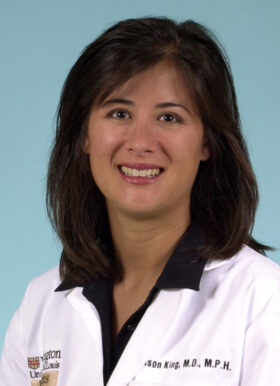
Allison A. King, MD, MPH, PhD
- Cancer (Oncology)
- Blood Disorders (Hematology)
- Pediatric Cancer
- English
Appointments
Sees Patients For
Pediatric hematology, pediatric oncology, pediatrics, pediatric cancer, treatment of children with sickle cell disease, central nervous system tumors, late effects of treatment and issues of survivorship
Hospital Affiliations
- St. Louis Children's Hospital
Locations
- St. Louis Children’s Hospital1 Childrens PlaceSt. Louis, MO 63110Fax: 314-454-2780Appointments:
- Northwest HealthCare1225 Graham RoadFlorissant, MO 63031Appointments:
Experience
Board Certifications
- Pediatrics
- Pediatric Hematology and Oncology
Academic Title(s)
Professor of Pediatrics, Hematology & OncologyAssistant Professor, Occupational Therapy
Assistant Professor, Division of Public Health Sciences
Research Interests
Expansion of a randomized educational rehabilitation trial for students with sickle cell disease and memory deficits. 7/1/2009 - 6/30/2012. Neurocognitive analysis of BMT CTN 0601 - Unrelated donor hematopoietic cell transplantation for patients with severe sickle cell disease using a reduced intensity conditioning regimen. National Marrow Donor Program 6/1/08 - 5/31/2010 and Cognition in children with sickle cell anemia. Doris Duke Charitable Foundation 12/15/2005 - 12/14/2009
Publications & Research
View research profile »Education
2015 St. Louis University, St. Louis, MO
2003 Pediatric Hematology-Oncology, St. Louis Children's Hospital at Washington University School of Medicine, St. Louis, Missouri
1992 Electrical Engineering, Washington University, St. Louis, Missouri
1996 University of Missouri School of Medicine, Columbia, Missouri
2003 St. Louis University, St. Louis, Missouri
1999 Pediatric, St. Louis Children's Hospital, St. Louis, Missouri